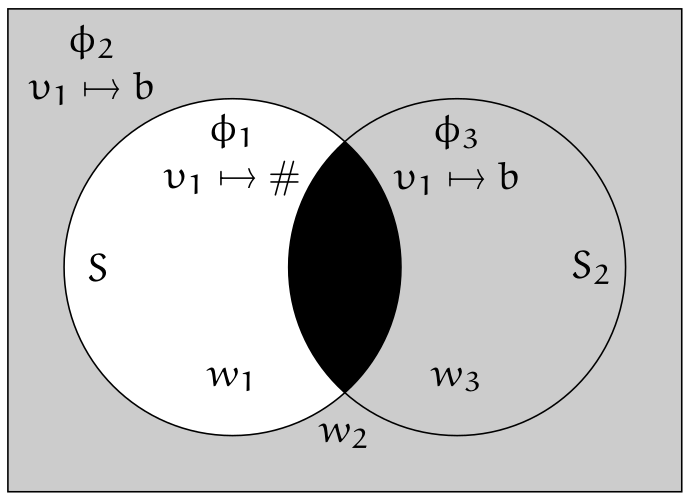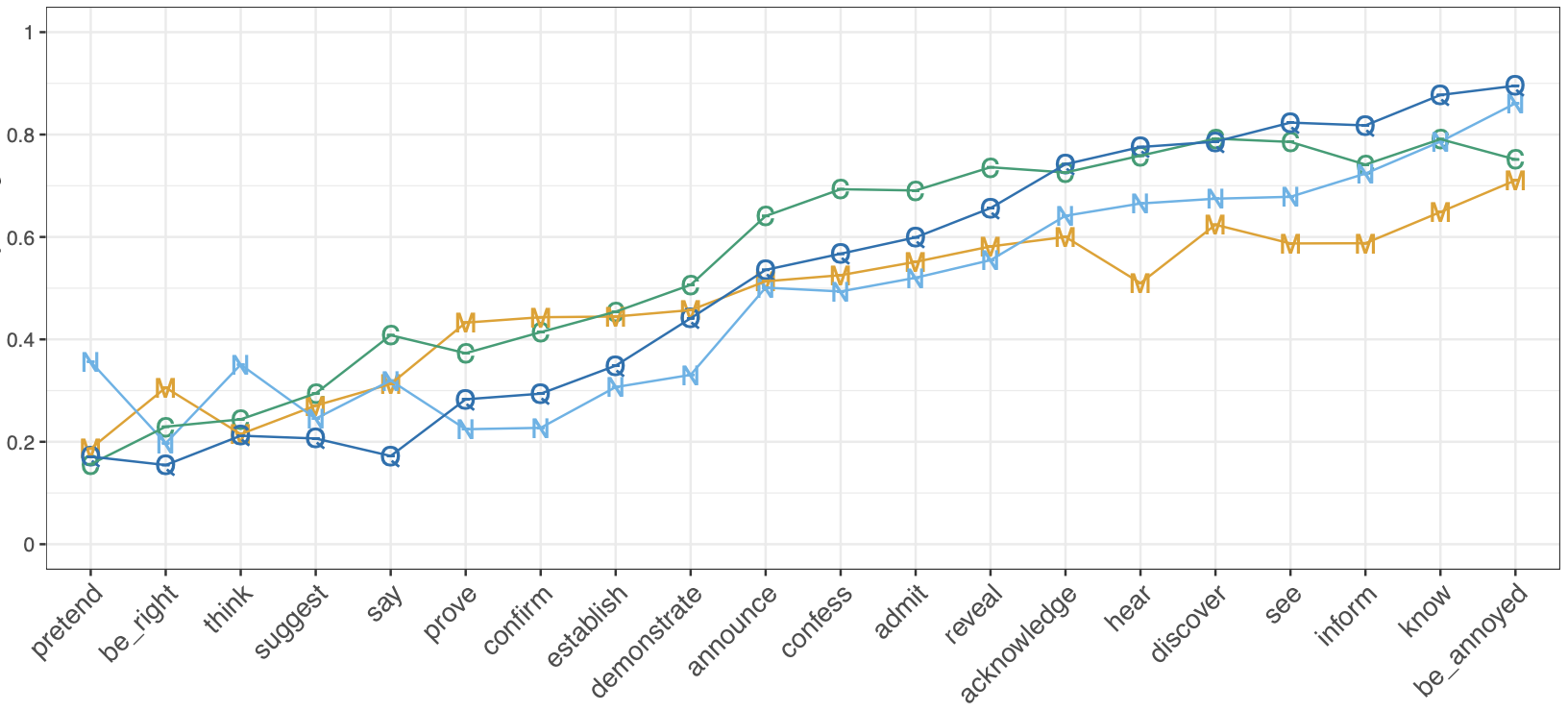Lisa Hofmann
Lisa Hofmann
I am a postdoctoral researcher in the Department of English Linguistics at the University of Stuttgart, working with Judith Tonhauser's group.
I study how humans interpret language meaning by integrating information from multiple sources. My research touches on issues in the subfields of formal Semantics, Pragmatics, Syntax, and Psycholinguistics. I wrote a doctoral dissertation, advised by Adrian Brasoveanu in the UC Santa Cruz linguistics department, about the interaction of Anaphora and Negation.
I work as a postdoc in Stuttgart to research projective content, pursue my ongoing projects, and teach linguistics courses.
Research

Anaphora and Negation
This project is about the interaction of anaphora and negation. I argue that we can explain this interaction by keeping track of speaker commitments about discourse referents, and the veridicality of the local contexts in which they are invoked. I study various kinds of anaphoric expressions, and non-veridical contexts.
Anaphoric Accessibility
Anaphoric relations are constrained by the veridicality of the embedding context of anaphoric expression and their antecedents. I suggest operationalizing veridicality by keeping track of speaker commitments about discourse referents. This allows for an account of anaphoric accessibility that allows for anaphoric dependencies in counterfactual and hypothetical contexts, and predicts key aspects of the interaction of negation and anaphora which have been problematic in the literature on anaphora.
- ESSLLI class: Explaining Anaphoric Accessibility (co-taught with Patrick Elliott)
-
The Anaphoric Potential of Indefinites under Negation and Disjunction
(Paper presented at the 2019 Amsterdam Colloquium) - See also my dissertation for in-depth discussion
Discourse-Negativity and Negativity-Tags
-
Anaphoric Polarity-Sensitivity is Sensitivity to Speaker Commitments
(Slides from Sinn und Bedeutung 2022) -
Anaphoric Negativity-tags without Sentential Negation
(Slides from XPRAG 2022) -
A Hyperintensional Account
(Paper presented at the 2019 ESSLLI Student Session)
Ellipsis and Negation
-
‘Why not?’ – Polarity Ellipsis in why-questions
(Handout presented at Linguistics at Santa Cruz 2018) -
‘Why not?’ – Polarity Ellipsis and Negative Concord
(2019 UCSC manuscript) -
Negative Indefinite Fragments and (Dis-)agreement
(Handout presented at the 2019 Workshop on Negation, Concord and Ellipsis at UCSC; joint work with Ivy Sichel)

Projective Content
I work on a project with Judith Tonhauser and Marie-Catherine de Marneffe about Projective Content.
We present experimental evidence that the projection of the content of attitude complements (i) varies between entailment-canceling operators, and (ii) that this by-operator variation differs between attitude predicates. The observed variability is not captured by existing theoretical accounts of projection (e.g., Heim 1983; van der Sandt 1992; Abrusán 2011; Schlenker 2021). Our results suggest that an analysis must consider interactions between predicates and operators and raise important questions for future research on projection.

Processing of Cataphora
A collaborative project with Vishal Arvindam, Stephanie Rich, Jorge Hankamer, and Adrian Brasoveanu about the processing of cross-clausal anaphora and cataphora.
We ask how acceptability judgments and incremental reading times for cataphora are sensitive to different connectives in syntactically non-subordinate structures. This work addresses the questions how the incremental processing of cataphora is influenced by semantic information, and the question how the meaning of but may be characterized in a way that explains its cataphoric licensing properties.
Updates will be found here...

Definiteness & Reflexives in San Martín Peras Mixtec
A collaborative project with Jason Ostrove about the pre-nominal particle mí in San Martín Peras Mixtec, an Oto-Manguean language spoken in Oaxaca, Mexico. We show that mí in combination with an NP could be characterized as a definiteness marker.
Further, mí occurs with pronouns, where it often receives a reflexive translation. Although ‘mí + Pronoun’ usually requires a local antecedent, many occurrences couldn’t be characterized as reflexive, logophoric, or bound. We are currently investigating the question of what precisely the locality-constraints on its anaphoric behavior are.
Previous Research

Performative Utterances
I wrote my BA thesis (supervised by Daniel Altshuler) on the semantics and pragmatics of performative utterances, discussing how the self-verification in performative utterances could be derived from the assertion of a self-referential semantic representation.
Dissertation: “Anaphora and Negation”
Abstract
My dissertation, Anaphora and Negation (advised by Adrian Brasoveanu), is about the interaction of these two phenomena. It provides a commitment-based account of discourse-polarity and anaphoric polarity-sensitivity by appealing to veridicality distinctions.
It investigates the interaction of anaphora and negation, addressing the overarching question of how human language users combine information from multiple sources into an integrated representation of language meaning. Because the interpretation of anaphora systematically depends on the discourse context, studying its interaction with the local utterance context addresses this overarching question.
The work provides arguments and evidence for theoretically understanding the constraints that negation places on anaphora in terms of speaker commitments and veridicality. Anaphoric accessibility is sensitive to negation because it is sensitive to the veridicality of the embedding context(s) of an anaphor and its antecedent.
On these terms, a formal semantic account of the interaction of anaphora and negation is developed. It is an intensional dynamic account based on Compositional DRT and flat-update systems, where negation and other non-veridical operators are treated as externally dynamic. I argue that we need to conceptualize discourse referents as an intensional and epistemic representation to capture the relevant interactions.
This provides a unified account of several related issues that have received disparate analyses in the previous literature: anaphora to indefinites under negation (double-negation, bathroom-disjunctions, discourse subordination, and cross-speaker cases), the interaction of propositional anaphora and negation, polarity-sensitive negativity-tags, and the question what counts as a negative sentence/utterance for the purposes of anaphora in discourse.
Teaching
Courses Taught at University of Stuttgart
- Language and Cognition: Introduction to Psycholinguistics (WiSe 2023/24)
- Semantic Theory (SoSe 2023)
- Language Variation: Sociolinguistics (SoSe 2023)
- Advanced Semantics/Pragmatics/Psycholinguistics: The Interpretation and Resolution of Anaphora (WiSe 2022/2023)
- Language and Cognition: Introduction to Psycholinguistics (WiSe 2022/2023)
- Semantic Theory (SoSe 2022)
- Language Variation: Sociolinguistics (SoSe 2022)
Guest Lectures and other Teaching
- Explaining anaphoric accessibility – Navigating non-veridical environments in dynamic semantics, Course taught at ESSLLI 2023 (Co-taught with Patrick Elliott)
- Negation and Anaphora – (Non-)Veridical Discourse Referents in Dynamic Semantics, Single session at Oxford University, Semantics and Pragmatics Seminar, Instructor: Daniel Altshuler (June 2021)
- Polarity Ellipsis, Single session at UC Santa Cruz, Ling 141 (Ellipsis), Instructor: Jorge Hankamer (December 2020)
- Logical Semantics – The Meaning of and, Single session at UC Santa Cruz, Ling 53 (Semantics I), Instructor: Adrian Brasoveanu (February 2018)
Teaching Assistantships at UC Santa Cruz
- Semantics 1, Instructor: Adrian Brasoveanu
- Winter 2020
- Winter 2018
- Semantics 2, Instructor: Jess H.K. Law (Winter 2021)
- Pragmatics, Instructor: Donka Farkas (Spring 2019)
- Language and Social Identity, Instructor: Ivy Sichel (Spring 2018)
- Ellipsis, Instructor: Jorge Hankamer (Fall 2020)
- Introduction to Linguistics
- With Jason Ostrove in Fall 2021
- With Matt Wagers in Fall 2019
- With Grant McGuire in Fall 2017
- Language and Mind
- With Matt Wagers in Fall 2018
- With Pranav Anand in Spring 2017
- Phonology 1,
- With Jennifer Bellik in Winter 2020
- With Amanda Rysling in Spring 2019
- Invented Languages, Instructor: Pranav Anand
- Spring 2021
- Summer 2020
Teaching Assistantships (Tutorium) at HHU Düsseldorf
- Grammatical Methods, Instructor: Melani Wratil (WiSe 2014)
- Introduction to Prolog, Instructor: Christof Rumpf (SoSe 2013)
CV (abbreviated)
Employment | ||
| 2022-present | Research and Teaching Associate | Universität Stuttgart, Institut für Linguistik |
Education and Training | ||
| 2016-2022 | PhD in Linguistics | University of California Santa Cruz |
| 2015-2016 | Visiting Scholar | UMass Amherst, Linguistics Department |
| 2011-2016 | BA in Linguistics (Computational Linguistics track) | Heinrich-Heine-University Düsseldorf |
Wed, 10:00–11:00 (WiSe 23/24)
(Or by appointment)
Keplerstraße 17 (K2)
70174 Stuttgart